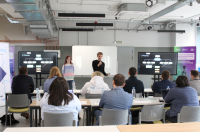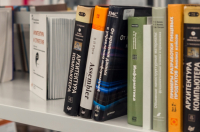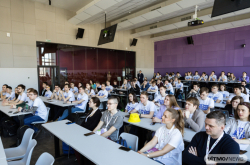Looking for sources
When it comes to finding your sources, there are several places you can start. If you don't have anything but your topic, then head right over to Google Scholar and search for your keywords. What to look for: authors and the peer-reviewed journals they are published in.
After this first scoop of articles, you can head over to your university's library webpage and search the database for specific authors or journals. I'd say gather seven or so highly-relevant articles and don't obsess over missing out on the giant chunk of what's been done before. You will get to this chunk all right, but first it’s better to sift through it.
Surviving the flood
For those sifting purposes, I am extremely happy to introduce you to a beta app and a fascinating AI-based discovery that is ResearchRabbit. If you are not immediately attracted by its emoji-induced user-friendliness, here are its top-notch features: you feed some of the relevant articles from the previous step into the algorithm and it searches the web for related works published before and after your initial ones. By adding more relevant articles, you’ll get more and more precise recommendations without having to spend hours manually analysing what your chosen authors reference.
If, however, you are looking for a more established solution, there is Connected Papers – basically, it does the same thing but also visualizes the papers in handy graphs. This way, you don't just get a better picture of the many interconnections, but are also sure not to miss a publication important to your project.
As a result of this step, those seven-ish initial papers will have turned into a considerable collection of articles that should provide you with an overview of your topic and generate ideas for your own project.
Accessing literature
Most universities provide access to quite an extensive list of journals and paper collections that can be viewed right from their libraries’ websites. As it is not always convenient to start your search there, you can use, for instance, EndNote Click (formerly Kopernio), a Chrome extension that allows you to open all articles your library has access to by automatically logging into your student account when you open, say, Nature or IEEE.
It's also worth keeping in mind that due to the ongoing campaign for open science, more and more journals are publishing their articles openly. You can view the list here or search one of the major open-access databases here.
Organizing your references
First, let me tell you what not to do by drawing an example from my own past. Don't just create a spreadsheet where you put your sources into columns like "title", "main idea", "relevance". Or at least don't do it in a Word document with no system of tags. This way, you will never ever get a rewarding experience out of perusing it.
Some ways to get a much better experience are:
-
Notion. This app is all the rage now, so I will only add that it has inbuilt templates you can use to beautifully outlay your articles, color-code them, and introduce a tagging system. There are also dozens of readymade templates of varying complexity available online. Downside: as far as I know, to generate your citations, you will have to use another tool like citethisforme or Scribbr's APA Reference Generator.
-
EndNote Click can also be used to sort your viewed articles into categories – again, by adding tags and then filtering your articles by them. A bonus: for almost any article, it can create a citation in almost every style imaginable.
-
Mendeley, Zotero (and the like) – these two are the most popular of a whole group of apps that allow you to keep all your sources in one place, sort them into projects, keep notes on them, or even search the available databases for new articles. What's good about those is that you can add your previously downloaded PDF articles to let the apps pick up all info about them on their own and then compile a reference in a wide variety of styles. Just as with the previous app, however, it is not always possible for every article, so do keep online citation generators at hand.

If you are a little overwhelmed by the choice of apps listed here, ask yourself one question: what part of working with literature scares you the most. Is it...
-
Finding enough relevant articles? – Look into Connected Papers or ResearchRabbit.
-
Keeping track of everything you’ve read? – Consider Notion or EndNote Click.
-
All that at once plus the catastrophe of making citations? – Get on friendly terms with Mendeley & Co. and you will know no trouble.
Good luck with your thesis or any other research endeavors!
If you are looking for other ways to get more organized, check out our budgeting tips and top-five techniques to study effectively. And if you are struggling with stress, head here for some advice. You've got this!




